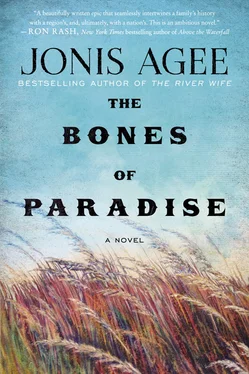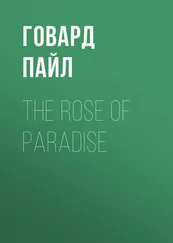He squinted in the dusty light to find the wounded man. There he was in the darkest corner, farthest from the stove, on the bed where the youngest or dumbest cowboy usually ended up. As Higgs eased down on the one opposite Graver, wincing at the warning stab of pain from his back, he studied the man. His long frame was thin and laced with hard muscles, his shirtless torso wrapped in Vera’s ragged muslin. His face was a chiseled mask, lines etched at the eyes and mouth, the high cheekbones, and below the strong nose the generous mouth seemed to suggest a good-natured smile. But hard times had created a perpetual crease on his brow, which he wore even in sleep. From the little history Higgs knew about him, Ry Graver had endured all the hardship life had to offer a man willing to venture west. Too bad his youngsters had to suffer. Graver was thirty-eight, but his face looked ten years older or more and his dark brown hair bore silver streaks. Higgs’s own hair had turned gray at twenty-five.
“If you’re done looking, I’d like to tell you what happened.” The voice was low and clear as his eyes slowly opened.
Higgs’s face flushed. “I’m listening.”
“Water?” Graver tilted his head toward his wrist, tied to the bed. The other arm was held against his body by the bandage.
Higgs stood and went to the crude bench by the door that held the bucket of water the men used for drinking, washing, and shaving. He filled the tin cup that hung on a leather thong from a nail in the wall, brought it to the bedside, and held it for Graver to drink.
When Graver was finished he sighed and laid his head back on the bed, eyes closed. A long minute passed before he said, “They’re all gone, wife”—he swallowed hard—“youngsters.” He paused for a long moment, then said, “I was walking out of the hills when I found the bodies.”
“When was that?” Higgs leaned forward, elbows on knees.
Graver thought for a moment. “Late morning.” He opened his eyes and looked at Higgs. “Spare another cup?”
Outside the crows were setting up a racket in the mulberry trees and made Higgs wonder if a coyote had been brave enough to come around in daylight.
After more water Graver closed his eyes and told his story. The image of the Indian girl’s body came back to Higgs with startling clarity. He should have done something about that. Animals probably worked it over pretty good after the men left last night.
Graver shook his head slowly and looked at Higgs. “Don’t see why he didn’t finish me.”
“So you didn’t have a shootout with J.B.?” Higgs watched as Graver’s face registered surprise, then anger.
“Hell no. Man fed my family.”
The words and tone sounded true. Higgs sat back, hands flat on his thighs. “Any notion who shot you?”
Graver shrugged, and a grimace of pain followed, his face graying, his voice barely a whisper as he said, “Sounded young.” Then his eyes drifted shut and his breathing quieted as he dropped off to sleep.
Higgs wanted to ask him about the blood-spotted picture of Mrs. Bennett Vera had found when she cleaned his wound. He studied the sleeping man. Why hadn’t the shooter circled around to finish him? With the dead Indian girl, probably some brave hopped the reservation, maybe J.B. stumbled on the killer burying the girl. Or maybe J.B. . . . Higgs stopped and stood. He’d have to go out there again, examine the girl, look for clues.
At the door he glanced back at Graver. Best move him to the house so he could keep an eye on him. Drum would want to hear his story when he finally showed up. When Higgs sent word about the funeral, Drum had replied, “I’m working cattle today.” Higgs would send a man to town for the lawyer tomorrow. Track down the widow. Tell the new sheriff, though he doubted the man would bother coming out for an Indian and a Bennett.
Rose quickly undressed and cleaned her sister’s body, biting back the memory of the times her hands had run the length of her sister’s arms and legs when Star was a baby and it was Rose’s job to care for her. The tips of her fingers lingered on the bruise around Star’s neck, where the man had stopped her breath. When she eased Star’s fingers loose, a gold locket on a chain lay nestled in her palm. Rose picked it up and found it was warm—as if she were still alive. Holding it out from her body, she stared at the object as she would a cluster of poison berries. What did it mean? Was it the killer’s? She pried open the locket, the faces inside, a white man and woman, were faded strangers. She closed it and tucked it in her pocket. She’d think on it later when her work was complete and she could finally mourn.
As the eldest surviving woman in her family, Rose bore the burden of the funeral ritual. She cleaned the sand from her sister’s ears and lips, then struggled to lift the shoulders and head so she could tug on the white deerskin dress, and cried out in frustration until Some Horses, her husband, rushed to her side. The dress was intended for Star’s wedding day, as it had been for Rose’s. The soft hide was fringed, beaded, and belled for the dancing that would take place. On the front, their mother, a fine artist, had painted a man and woman on horseback, wearing war paint and wielding spears to protect the new family. Now it would go to Wanagi Makoce, the spirit land, where Star would wear it proudly among the dead.
Rose smoothed the fringed arms and hem, and sang to force away the grief, but it didn’t work. She wasn’t ready to mourn. She wrapped the dark blue shawl her aunt had contributed around her sister’s hips, and then picked up the star quilt she had made when she was twelve, the stitches surprisingly small and neat, the pieces of yellow and white cloth bursting from the center, and set it down again. Wrapping her sister in the quilt would be the final act before they moved her to the Buffalo Grounds. She ran her fingers down Star’s arm, and then removed the silver bracelet Some Horses had won for her in a game at the last powwow and put it on her sister’s wrist. She fastened the red-and-yellow quill earrings and kissed Star’s lips one last time, jerking back when she felt their warmth. They had waited a day to see if she would revive after they found her in the Sand Hills and carried her to Rosebud, as was their custom, hopeful when they saw the fresh tears in her eyes, but new breath never came. Even now.
Rose glanced around the tipi. Some Horses was outside readying the travois to bear the body after dark. The old ones spoke of ghosts who would come back to bother the living, but Rose never believed them. She hated to see a good tipi or house burned after death to keep the spirit from returning. She welcomed Star’s spirit, though she knew it was wrong. When another tear seeped from her sister’s eye, Rose captured it on the tip of her finger and pressed it inside her blouse against her heart. As she wrapped Star in the quilt, rolling her so she could pull it tight, she thought she could hear her sister murmur, the voice so far away she could not distinguish the words. She made a choice then—one she would reconsider over the next few months. She continued to wrap the body until the final edge could be neatly tucked and there was only silence. It was her sister’s spirit calling, not a living Star. She’d heard stories of this, especially when the death was a violent one. Rose must work hard to keep the spirit in her sister’s body so they could rise together and enter the red road as one.
She stepped back, pressed her hands together to keep them from removing the quilt and freeing Star. From childhood she had been trained to perform the death rituals, heard stories of ghosts wandering the earth because they were not properly sent to the spirit world. She knew what she was supposed to do whether she wanted to or not.
Читать дальше












